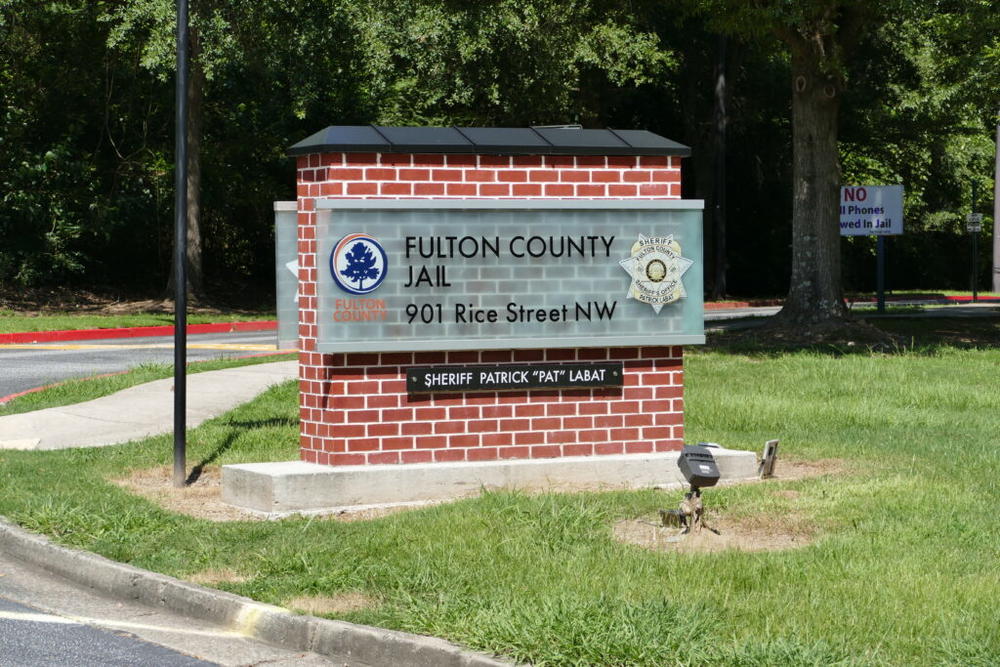
Caption
Fulton County officials estimate it will cost $1.7 billion to replace the overcrowded Fulton County Jail that opened in 1989.
Credit: Stanley Dunlap/Georgia Recorder

Fulton County officials estimate it will cost $1.7 billion to replace the overcrowded Fulton County Jail that opened in 1989.
Within six months of the Muscogee County Jail opening a new wing a few years ago, the jail was already filled to capacity.
“I don’t care how much bigger a jail you build, it’s going to stay overcrowded because the cases have to be handled in the courtroom,” Stephen Craft, a retired chief assistant public defender in Columbus, said Monday to a state Senate public safety subcommittee.
During the three-hour hearing Monday, the panel listened to testimony about the public defender’s role in decreasing overcrowding in jails like the lockups in Muscogee and Fulton counties. Over the past several months, the Senate panel has held several hearings investigating conditions at Fulton’s Rice Street jail and other detention facilities. The committee has been tasked with examining how cases are prosecuted and the impact of crime in Atlanta and other communities.
About 10% of Muscogee County jail inmates now face murder charges, which represents about 2% of a judge’s overall caseload in the six-county Chattahoochee Judicial Circuit, according to Craft.
When Craft retired in June, the public defender’s office had 14 pending homicide cases as well as 300 other cases, ranging from entering an automobile to drug possession.
Craft said that the Columbus-based Muscogee State Court, for years, expedited hundreds of misdemeanor cases by working closely with the solicitor general to prepare recommendations for the judge in advance. The superior court, which deals with felony, civil disputes, and family domestic cases, does not operate the same way, he said.
Homicide cases are given priority on the court calendar and the average Chattahoochee public defender had 400 pending cases as recently as a few months ago, Craft said.
“There is no push to bring minor cases to trial,” Craft said.
Republican Sen. John Albers said the committee is investigating jail overcrowding across the state, including Fulton where the average incarceration is 300 days, compared with a national average of about 30 days.
“The jail is not meant to be a permanent facility,” Albers said.
In the Atlanta Judicial Circuit, Public Defender Maurice Kenner said the average caseload for public defenders with complex cases such as homicide and sexual assault is 60 to 85 at a given time, while the other lawyers in his office typically handle about 200 cases.
Kenner said he believes that having more judges available to handle cases and faster processing of state crime lab results would help improve overcrowding in the Atlanta jail.
Albers on Monday asked Omotayo Alli, executive director of the Georgia Public Defender Council, what she believed was the biggest obstacle to reducing the time people spend locked up in Fulton.
“We’re trying to figure out the root cause of these issues, and we realized that public defenders can’t force the trial calendar to be set or the prosecution to push things forward,” Albers said.
Alli said one of the challenges to getting people out of jail faster is the level of collaboration during pretrial negotiations, which includes taking advantage of available social services so that people can be released on bond for lower level offenses.
“We’re hoping to meet with the district attorney, meet with all the powers that be. There are some cases that we can work out by providing socially responsive resources outside the jail,” Alli said.
“Our attorneys make those recommendations. The question is I don’t know how far those recommendations go,” Alli said.
She said that if she had her wish, the state public defender’s office would receive additional funds to hire and retain more attorneys.
“We have done very well in the last four years but we’re still not competing with (private) attorneys,” Alli said.
According to Craft, one of the best ways to attack a case backlog is to establish a rapid resolution program, which allows low-level crimes to be handled more quickly, freeing up jail space and allowing officials to focus on more complex, serious offenses.
During rapid response, full-time staff from the public defender’s office and district attorney’s office collaborate to reach a resolution in cases that have been reviewed by judges and law enforcement.
A rapid response team can help reach a bond agreement by the preliminary hearing, Craft said.
The judicial process could be made more efficient by halving the number of cases each public defender has on their calendar.
“Now that I only have (half the cases), I am able to look at the low hanging fruit and say these are non-complex cases and call the DA and say what can we do about this case?” Craft said.
This story comes to GPB through a reporting partnership with Georgia Recorder.